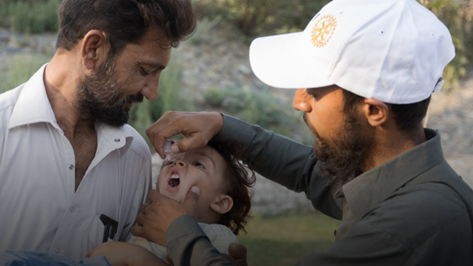Progress in the fight against Poliomyelitis: Rotary's initiatives for World Immunization Week
To mark World Immunization Week, applaud efforts to date in the fight against polio and renew commitment to future work, Rotary has produced a video film celebrating the importance of polio vaccination as an important tool at the disposal of Public Health against infectious diseases and their sequelae. Indeed, progress against this crippling disease is the result of the efforts of countless volunteers and health workers who immunize children in hard-to-reach communities and carry out real-time global surveillance and outbreak response mechanisms.

To mark World Immunization Week, numerous national and local initiatives are being promoted to celebrate this important recurrence, including this video sponsored by Rotary that the VaccinarsinSardegna team invites you to watch.
Raising awareness about the power of vaccines and closing immunization gaps through evidence-based, attentive and targeted communication, in fact, is a valuable support to all awareness-raising activities aimed at the general population and implemented alongside mass vaccination campaigns to fight vaccine-preventable diseases, including poliomyelitus, the eradication of which is a primary goal for Global Public Health.
Poliomyelitis, in fact, is an acute, highly contagious infectious disease caused by viruses (polio viruses, belonging to the genus Enterovirus) that affect the nervous system by affecting neural cells and inducing paralysis that, in severe cases, can be fatal.
Since there are no drugs that can cure this disease, the only line of defense is preventive vaccination. Thanks to mass vaccination campaigns, polio cases since 1988 have decreased by 99.9 percent, and Italy itself was officially certified "polio-free" on June 21, 2002 (although the last case to occur was in 1982).
In this context, Rotary's perseverance has played a huge role in leading the world to the milestones achieved today. In fact, Rotary members have been at the center of the worldwide effort to eradicate polio for more than three decades. Rotary launched PolioPlus in 1985 and helped found the Global Polio Eradication Initiative (GPEI) in 1988, with the goal of eradicating the disease and ridding the world of its sequelae. In this regard, it is worth mentioning that at the time of GPEI's founding, the wild poliovirus was paralyzing hundreds of children every day, with an estimated 350,000 polio cases per year in 125 countries. Since then, cases have dropped by more than 99.9 percent, preventing paralysis for more than 20 million people.
Through a funding partnership with the Bill & Melinda Gates Foundation, Rotary pledges $150 million annually to fight polio, with more than $2.6 billion and countless volunteer hours offered by members and supporters. With GPEI partners, members engage with communities around the world to encourage high vaccination rates and help immunize more than 400 million children each year.
However, despite the enormous advances in vaccine medicine, which we are witnessing now more than ever thanks to the anti-SARS-Cov-2 vaccination, the reappearance of polio in polio-free countries continues to remain a possible event as long as there are areas of the world where the disease is present and widespread.
Polio, in fact, remains endemic in two countries, Afghanistan and Pakistan while there are 35 countries at epidemic risk in the five regions: Africa, the Americas, Eastern Mediterranean, Europe and Southeast Asia. Finally, for some countries, such as Burkina Faso, Eritrea, Ethiopia, Guinea, Guinea-Bissau, Liberia, Mauritania, Senegal, Sierra Leone, South Sudan, Tajikistan, and Uganda, the risk of polio returning is increasingly tangible due to low levels of immunity and surveillance.
In this regard, it should be emphasized that the future of polio eradication must be based on improving active surveillance systems and implementing epidemiological studies conducted in order to monitor wastewater, both of which are key tools in ongoing monitoring and control efforts.
Before we can celebrate the long-awaited eradication of polio, therefore, we need to remain vigilant and continue working to immunize up to 400 million children each year.
World Immunization Week, therefore, appears to be the best opportunity to raise awareness toward consciously chosen adherence, spreading awareness of the importance of vaccination among parents, caregivers, health professionals, decision makers and the media, and also emphasizing the need to protect oneself with vaccines throughout life.
Stay tuned to our website so as not to miss any upcoming updates.



